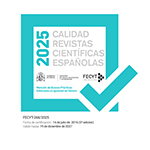Public opinion and propaganda: Their definition, interpretation and meaning in the United States at the beginning of the interwar period (1918-1922)
Abstract
The present work reconstructs the way in which the concepts of ‘propaganda’ and ‘public opinion’ were defined and perceived by American intellectuals and policy-makers during the first years following the end of the Great War. The documentary sources analyzed for this study were produced by social scientists (academics works), journalists (press articles) y politicians (presidential speeches) of that time. The central thesis of the research is that, as for the interpretation of the notion of ‘propaganda’ and ‘public opinion’, a radical interpretative shift took place in that period as a consequence of the propagandistic experiences of the war, the recurrent radical movements’ informative campaigns and the emergence of new and more efficient mass media. It is stated that these first scholarly postulates constituted the breeding ground for the emergence of the well-known debate on the manufacture of consent that characterized the interwar period.Downloads
Article download
License
Aquellos autores/as que tengan publicaciones con esta revista, aceptan los términos siguientes:
a. Los autores/as conservarán sus derechos de autor y garantizarán a la revista el derecho de primera publicación de su obra, el cuál estará simultáneamente sujeto a la Licencia de reconocimiento de Creative Commons Reconocimiento-No comercial-Sin obra derivada 4.0 España que permite a terceros compartir la obra siempre que se indique su autor y su primera publicación esta revista.
b. Los autores/as podrán adoptar otros acuerdos de licencia no exclusiva de distribución de la versión de la obra publicada (p. ej.: depositarla en un archivo telemático institucional o publicarla en un volumen monográfico) siempre que se indique la publicación inicial en esta revista.
Plagio y fraude científico
La publicación de un trabajo que atente contra los derechos de propiedad intelectual será responsabilidad de los autores/as, que serán los que asuman los conflictos que pudieran tener lugar por razones de derechos de autor. Los conflictos más importantes pueden darse por la comisión de plagios y fraudes científicos.
Se entiende por plagio:
1.Presentar el trabajo ajeno como propio.
2.Adoptar palabras o ideas de otros autores sin el debido reconocimiento.
3.No emplear las comillas u otro formato distintivo en una cita literal.
4.Dar información incorrecta sobre la verdadera fuente de una cita.
5.El parafraseo de una fuente sin mencionar la fuente.
6.El parafraseo abusivo, incluso si se menciona la fuente.
Las prácticas constitutivas de fraude científico son las siguientes:
1.Fabricación, falsificación u omisión de datos y plagio.
2.Publicación duplicada.
3.Conflictos de autoría.












